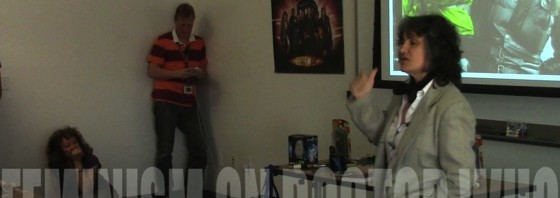A short clip from the presentation “Doctor Who and Culture: with Dr. Rosanne Welch
Subscribe to Dr. Welch’s YouTube Channel
Transcript:
The other thing that Russell said that really struck me, as a feminist, was as bad as it is for a gay man or a person of color to watch television, it totally sucks to be chicks. Because chicks on TV are pretty much all about being cute. That’s tough. How do you deal with that? So, when he did Torchwood, he purposely made sure the cop was a female and her husband is the guy who stays home and makes dinner — and worries about whether she’ll get shot at work and come home.
He completely gender switched the situation so that little girls could see a woman saving the world from bad aliens and that was important to him. And I thought that was really interesting because he’s right, right? Even as much as I like The Big Bang Theory, with my little slide there, Amy started out as cool as Sheldon and as weird and now all she wants is to get laid. That is all that character wants. What happened?!? She is like a nuclear physicist. She totally turned into just another girl who wants a boy and without the boy she is not complete. They ruined that character. Right?
So Russell wanted to make sure he created a woman who all the way through is the power source. She’s the one saving the world. So little girls could look up to that. So again, Russell took a step further than Steven took and that shocks me. I wasn’t ready for that.
Dr. Rosanne Welch, Cal Poly Pomona Faculty from the Department of Interdisciplinary General Education discusses Doctor Who and how the show has changed television writing. Doctor Welch will further discuss how society looks at culture and gender roles with the use of the Doctor and his companions’ adventures.
“Natalie Lopez at the CalPoly University Library invited me to do a presentation for National Libraries Week on Doctor Who and Culture so that’s why a group of Whovians from both CalPoly and CSUF gathered in the Special Events room on April 16th. It was wonderful to look out over a sea of t-shirts and other Doctor paraphernalia present among the crowd as I pontificated about what makes Who great – mostly giving me a chance to present a case for the fact that writers make Doctor Who and therefore writers make culture.”

